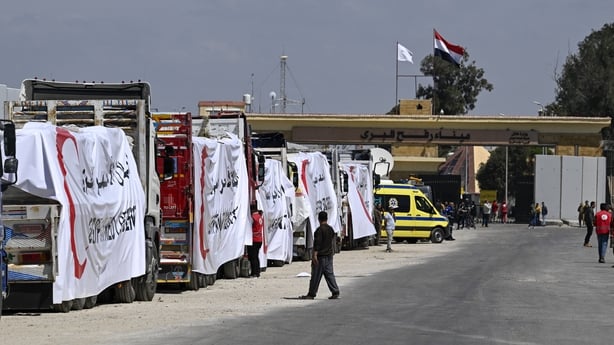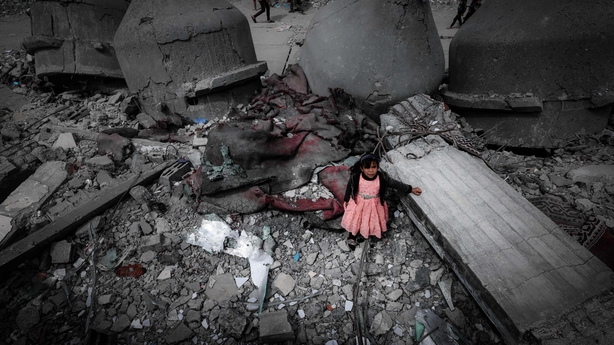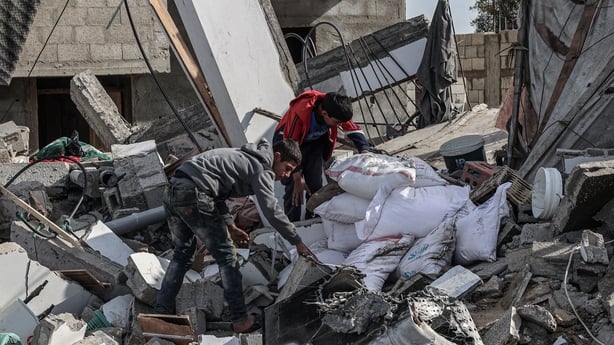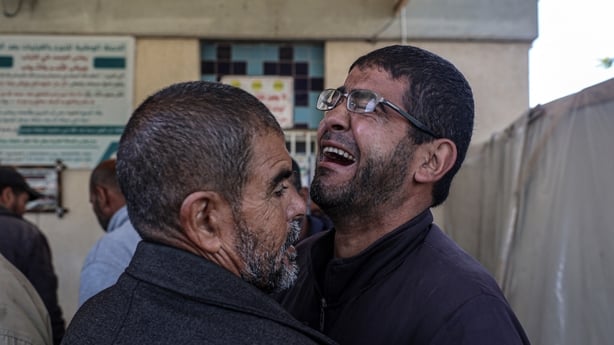A long line of blocked relief trucks on Egypt's side of the border with Gaza where people face starvation is a moral outrage, UN Secretary-General Antonio Guterres said during a visit to the Rafah crossing today.
It was time for Israel to give an "ironclad commitment" for unfettered access to humanitarian goods throughout Gaza, said Mr Guterres, who also called for an immediate humanitarian ceasefire and the release of Israeli hostages held in Gaza.
The UN would continue to work with Egypt to "streamline" the flow of aid into Gaza, he told reporters in front of the gate of the Rafah crossing, an entry point for aid.

"Here from this crossing, we see the heartbreak and heartlessness of it all. A long line of blocked relief trucks on one side of the gates, the long shadow of starvation on the other," he said.
"That is more than tragic. It is a moral outrage."
The visit by Mr Guterres comes as Israel faces global pressure to allow more humanitarian aid into Gaza, which has been devastated by more than five months of war between Israel and Hamas.
Israel is threatening to launch a major military operation in the southern Gaza city of Rafah, just over the border from Egypt, despite international appeals against such an attack.
A majority of Gaza's 2.3 million residents are sheltering around Rafah. Though conditions are worse in the north of the territory, the plight of civilians across Gaza has deteriorated sharply as the conflict has ground on.
Before his stop at the border, where he met UN humanitarian workers, Mr Guterres landed in Al Arish in Egypt's northern Sinai, where much of the international relief for Gaza is delivered and stockpiled.

Receiving him, regional governor Mohamed Shusha said some 7,000 trucks were waiting in North Sinai to deliver aid to Gaza, but that inspection procedures demanded by Israel had held up the flow of relief.
Mr Guterres also visited a hospital in Al Arish where Palestinians evacuated from Gaza are receiving treatment.
As hopes for a truce in Gaza during the Muslim holy month of Ramadan have faded and the humanitarian situation in Gaza has become more desperate, the US and other countries have sought to use air drops and ships to deliver aid.
But humanitarians say only about one-fifth of the required amount of supplies has been entering Gaza, and that the only way to meet needs is to rapidly accelerate deliveries by road.
Spreading hunger
Israel, which has vowed to destroy Hamas and claims that the Palestinian militant group will divert aid, has kept all but one of its land crossings into the enclave closed.
It opened its Kerem Shalom crossing close to Rafah in late December and denies accusations by Egypt and UN aid agencies that it has delayed deliveries of humanitarian relief.
This week, a global food monitor warned that famine was imminent in northern Gaza and could spread to other parts of the territory if a ceasefire is not agreed.
"It's time for an ironclad commitment by Israel for total, unfettered access for humanitarian goods throughout Gaza," Mr Guterres said.

"It's time to truly flood Gaza with life-saving aid. The choice is clear: either surge or starvation," he said.
More than 32,000 people have been killed by Israel's military campaign in Gaza, many of them women and children, according to local health authorities.
Israel launched its bombardment and invasion of Gaza in response to an attack by Hamas in which around 1,200 people were killed and more than 250 taken hostage, according to Israeli tallies.
UN rights chief Volker Turk earlier this week accused Israel of conducting the conflict in a way that "may amount to the use of starvation as a method of war". Israel rejected the allegation.
'Defeat of Hamas'
Meanwhile, just across the border from Egypt, the city of Rafah in southern Gaza has become a matter of dispute between Israel and the US.
"We have no way to defeat Hamas without getting into Rafah and eliminating the battalions that are left there," Mr Netanyahu said yesterday.
However, Mr Blinken said an invasion of Rafah was "not the way to achieve" that aim.
"We have the same goals as Israel: the defeat of Hamas," the top American diplomat wrote on X after meeting with Mr Netanyahu.

"Next week I will meet again with Israeli officials in Washington to discuss a different way we can achieve this objective."
On his latest wartime tour of the region, to support truce talks in Qatar, Mr Blinken also expressed disappointment over the failed UN resolution.
He accused China and Russia of "cynically" using their vetoes, while Hamas expressed its "appreciation".
As diplomats sparred in New York, Israel's spy chief David Barnea headed to Qatar for negotiations with CIA chief William Burns and Qatari and Egyptian officials.
The mediators are aiming to secure the release of Israelis still held by Gaza militants in exchange for Palestinian prisoners in Israeli custody and the delivery of more relief supplies.

